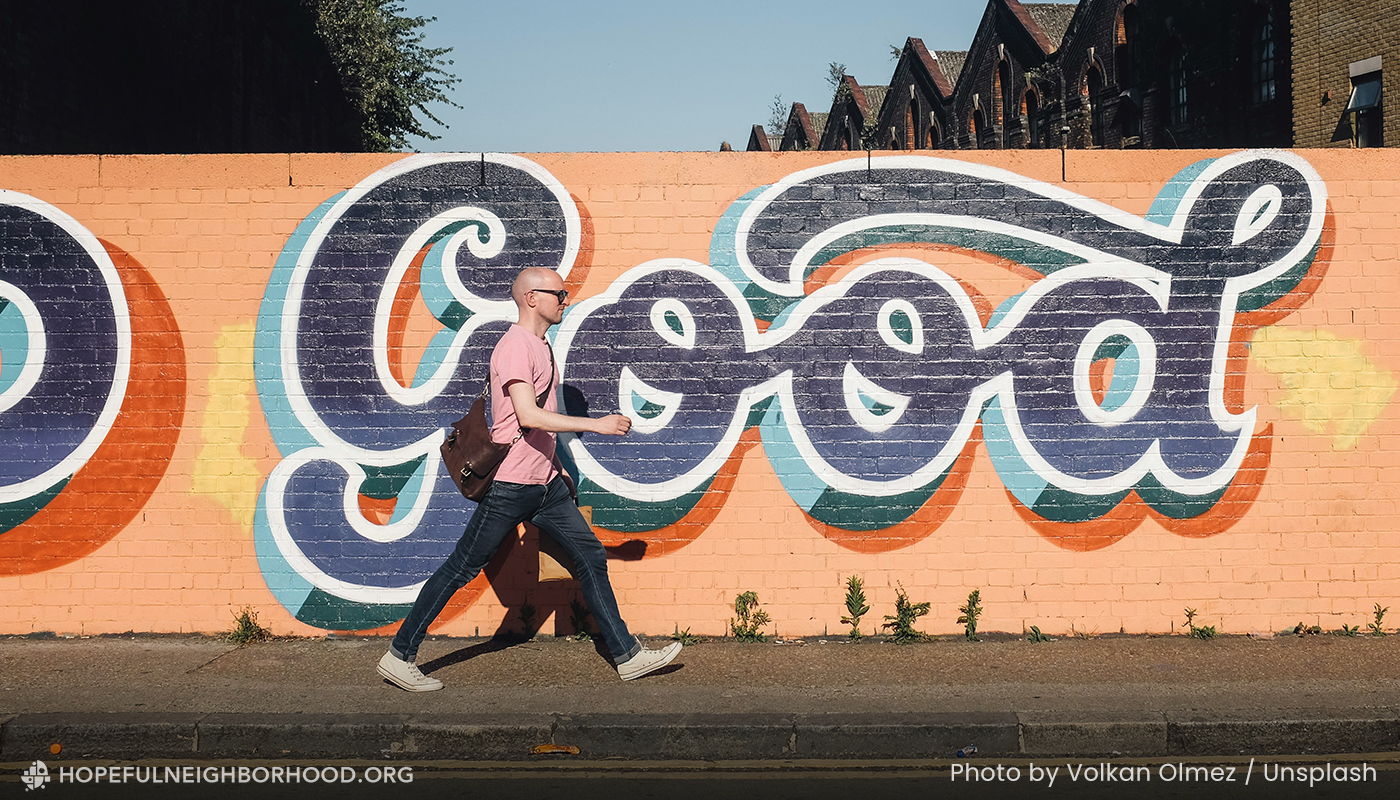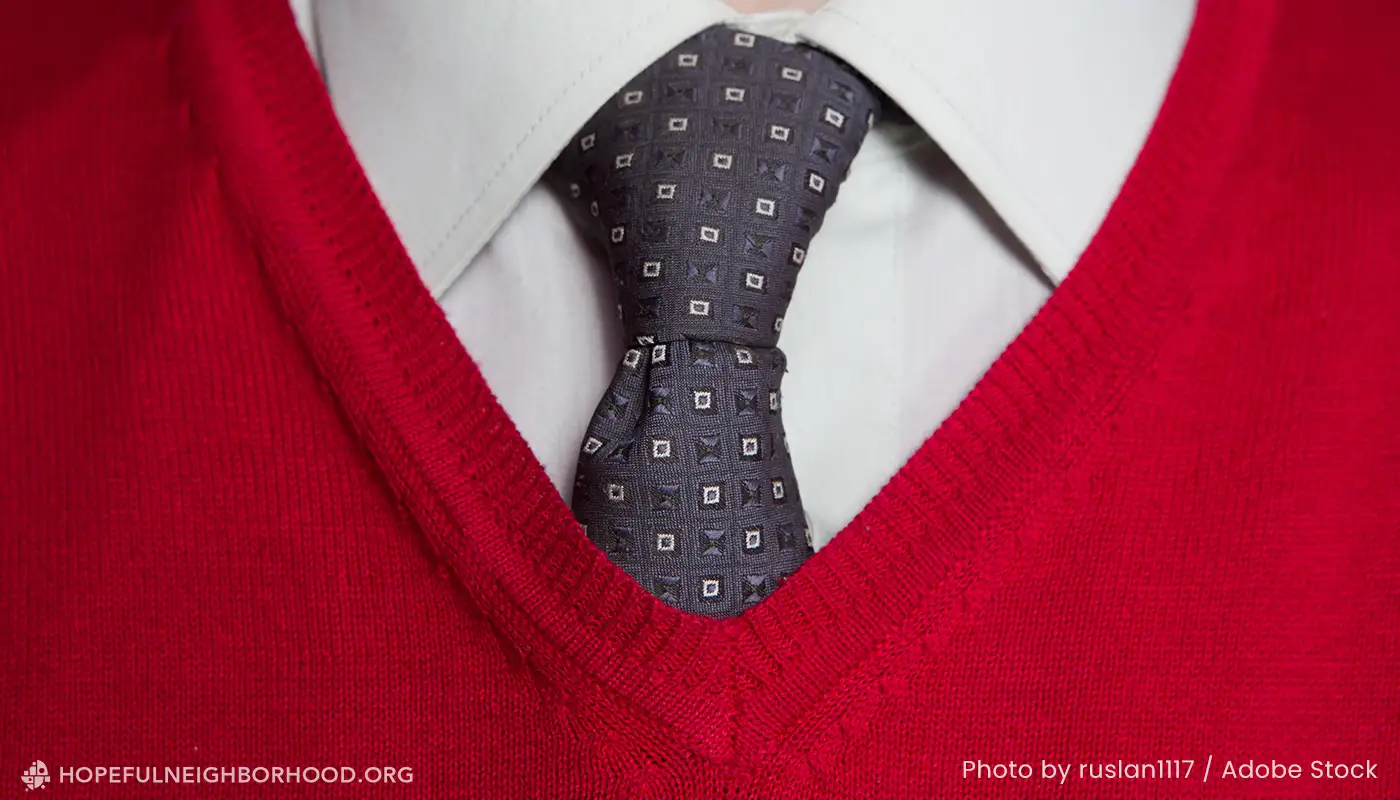This blog post is the third in a three-part series by Dr. Mary Manz Simon. Mary met Fred Rogers while writing an article about the famous television personality, and they developed a long-distance friendship in the following years. She wrote these posts to share his words of wisdom with The Hopeful Neighborhood Project so we, too, can learn about neighboring from one of the best.
There’s no desk. That was my initial observation.
Before Fred Rogers came into the room, I glanced around his tiny office. Two pairs of sneakers were tucked beneath a couple of chairs. A sofa added to the cozy warmth. I shouldn’t have been surprised at the comfortable space. After all, a man who invited thousands into his television neighborhood each day would naturally offer a welcoming space in real time.
It was 1994 and I was there to interview Fred for an article I had been commissioned to write. What I didn’t know going into that interview was the lasting impact and the ongoing friendship I would experience from our time together.
Upon reflection, I’m not surprised he was so intentional about the space. Fred’s onscreen persona communicated a man at peace with himself and others. Offscreen, he reflected that same serenity. During our interview, and in our ongoing communication for years after, Fred embodied “being present in the moment.” Before mindfulness was a trending topic, Fred Rogers was living it. While wearing zippered cardigans, Fred taught me—and many others—the value of mindfulness through his careful creation of space, feelings, and the words he shared.
I later learned that Fred felt a desk would separate him from those who came to see him. That thinking was pure Mister Rogers.
Mindfulness is one of the many lessons I learned from Fred Rogers. Mindfulness replenishes energy. Creative outlets like writing or planting a garden, walking around the neighborhood or other physical activities can reduce stressors. Setting boundaries frees space for ourselves. How do you create space in your day?
Here are four other takeaways from my conversations:
1. Look for the best in others. Or in his words, “Be an advocate for your neighbor.” Fred valued core qualities, those individual strengths and abilities that make each of us so special.
In our fast-paced lives, building relationships often happens at warp speed. As a result, we befriend people on the surface. More meaningful relationships happen when we connect in more personal settings. Learning about passions and interests often leads to an appreciation of personal strengths and talents.
2. Do your best. Fred said, “I want to do the best I can for children and their families.” I watched an example unfold in the studio one day. When taping a Neighborhood scene, he was perfect. From my perspective, there was not a single mistake. Fred said, “It’s getting there …” and then taped and re-taped multiple times before the scene met his lofty standards.
Fred strove for excellence. He wasn’t seeking to please others, but “merely” to reach the high bar he set for himself. He wasn’t trying to be better than anyone else, just trying to be the best Fred McFeely Rogers he could be. In what ways will you reflect personal excellence today?
3. Be kind. Fred’s definition of kindness has been quoted often: “There are three ways to ultimate success. The first way is to be kind. The second way is to be kind. The third way is to be kind.”
I believe that Fred’s deep sense of kindness came about very naturally: he cared about the world around him. For example, Fred received a letter from a young viewer who was worried the fish in his studio tank were hungry. Fred’s response was evident in the programs taped after that letter arrived: he fed the fish. The Mister Rogers we all saw was even kind to the fish. In what ways do you show your connection to creation?
4. Be hopeful. Fred told me, “Self-esteem is about who you have been, who you are now and … who you can become. I think it all has to do with hope.” That’s a meaningful message to carry into this day and every day.
It’s easy to plug into negativity. After all, bad-mouthing and complaining pollutes our thoughts, even subconsciously. Directly contrasting this, Fred wrapped our world in hope. When looking ahead toward a brighter tomorrow, we can plan constructively for what comes next. Even at the age of 75, I anticipate tomorrow. What fuels your hope for tomorrow?

Fred died in 2003, but writing this post reminded me of the great gift he left: he cared about me and the millions of others who heard him sing in the song he wrote, “It’s You I Like.” A friendship that began with a simple cover story interview was sustained through the years by visits and numerous notes back and forth. My heart warms when skimming through the stack of hand-written notes and letters. Eventually, the paper will yellow, but the timeless truths he shared will remain.
Among all the notes with his characteristic calligraphy, a single line pops out, “My thanks for your abiding friendship.” That too, was pure Fred.




0 Comments